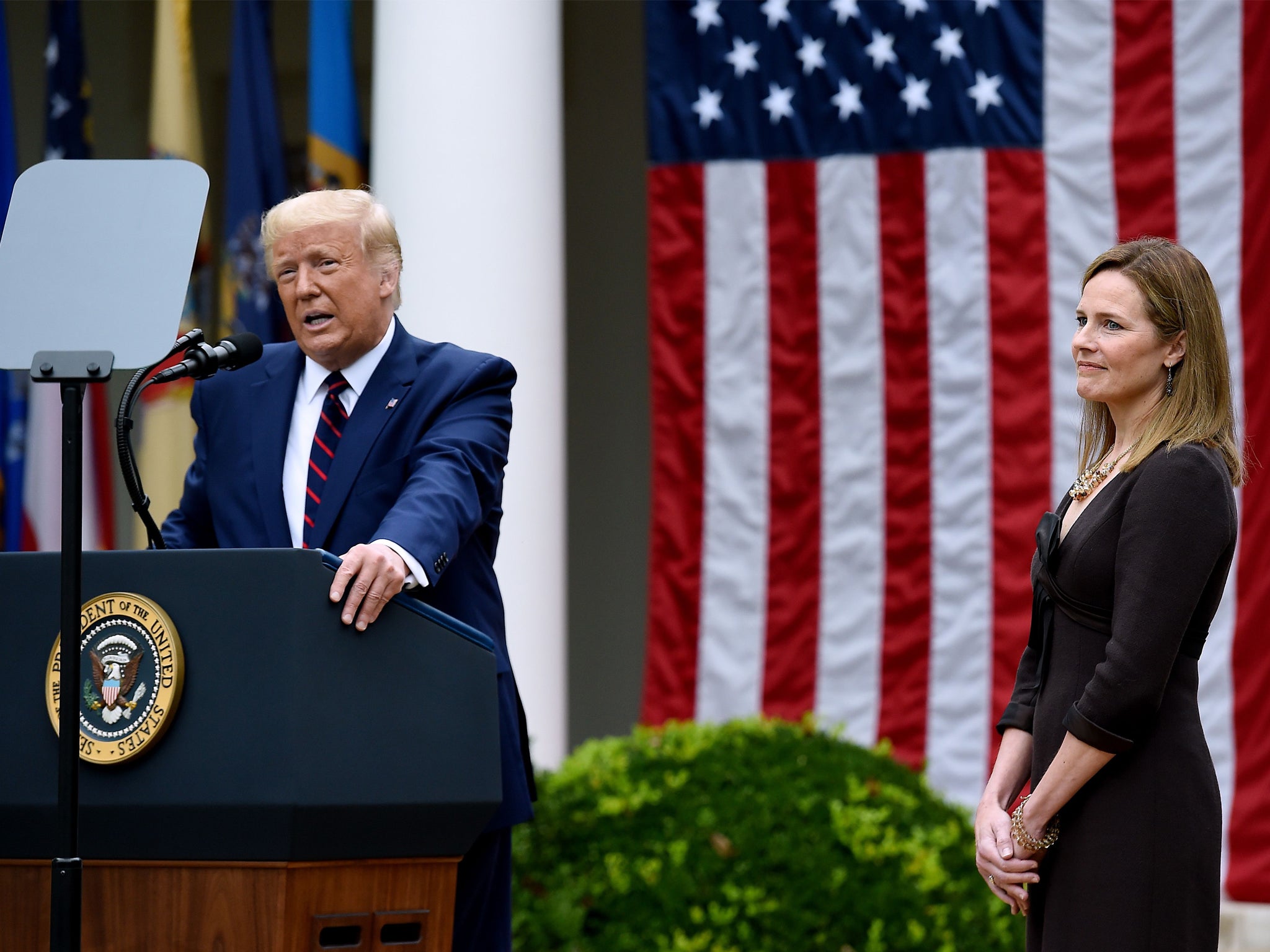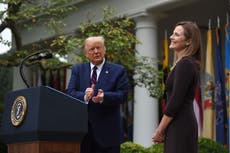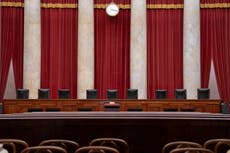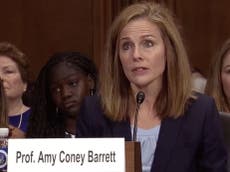Supreme Court nominee Amy Coney Barrett spoke at training programme intended to support a ‘Christian worldview in every area of law’
The Christian training programme questions “so-called separation of church and state”

Judge Amy Coney Barrett, President Donald Trump's nominee to replace Ruth Bader Ginsburg on the Supreme Court, publicly grappled decades ago with the tension Catholic judges can face between their religious values and the law. She has since said that she would never bend the law to meet her Catholic faith.
But her role as a speaker at a training programme for Christian law school students drew scrutiny three years ago when Trump nominated her to be a federal appellate judge. It may do so again now – as part of broader questioning about how she would balance faith and law – as she seeks confirmation to the nation's high court.
Barrett was a paid speaker five times, starting in 2011, at the Blackstone Legal Fellowship, a summer program established to inspire a "distinctly Christian worldview in every area of law," tax filings show. It was founded to show students "how God can use them as judges, law professors and practicing attorneys to help keep the door open for the spread of the Gospel in America".
The Blackstone programme is run by Alliance Defending Freedom (ADF), a legal advocacy group whose founding leader has questioned the "so-called separation of church and state" as it is often understood. In the years Barrett spoke there, the fellowship's suggested reading list included a book co-written by the same leader who lamented how Christians for too long had been "AWOL from the courthouse".
When Ms Barrett was before the Senate in 2017, to be confirmed as a judge on the US Court of Appeal for the 7th Circuit, she was asked about those speaking engagements and grilled particularly on the ADF's stance on gay rights. Senators did not address the program's goal of connecting Christian teachings to the practice of law, which has been little noted in the context of Barrett's role on the courts.
"I would never impose my own personal convictions upon the law," Ms Barrett said at the time, when asked whether her deeply held faith was at odds with her ability to render impartial judgments.
Judd Deere, a White House spokesman, said in a statement in response to questions for this report: "Judge Barrett has said that as a judge she's not a policymaker and that it's not appropriate for her or any judge to follow their personal convictions in deciding a case, which is also one of the many reasons President Trump laid out as to why he selected her as his nominee to the Supreme Court."
Already, Barrett's supporters are rejecting the notion, floated by some critics, that her faith might unduly influence her jurisprudence. "Judge Barrett has proven herself a highly capable legal scholar and jurist committed to the Constitution and the rule of law, and all Americans – including but especially Catholics – should recoil at the suggestion that her faith and personal life would prescribe otherwise," Michael Moreland, a professor of law and religion at Villanova University, wrote in the National Review on Friday.
MsBarrett, a favourite of social conservatives, has argued that justices should not be bound by a court precedent that they believe is out of step with the Constitution. That position has led many to say she may vote to overturn Roe v. Wade, the landmark 1973 decision that legalised abortion.
Sen. Josh Hawley, R-Mo., has said he will only support a nominee who explicitly acknowledges that Roe v. Wade was wrongly decided. Last week, Hawley – who also has served as a Blackstone faculty member - said Barrett "clearly meets that threshold."
As a federal appellate judge, MsBarrett has ruled skeptically about a broad interpretation of abortion rights and has shown a willingness to entertain state restrictions on the procedure. But she has been on the bench for only three years, and in most instances was joining more senior colleagues in opinions they wrote.
In the most notable abortion case, MsBarrett joined in a dissent that said the Supreme Court's decision in Planned Parenthood v. Casey, which reinforced the right of a woman to choose abortion before viability, had not considered whether the reason for choosing to terminate a pregnancy might matter.
In another case, she joined in a decision to uphold a Chicago law that put restrictions on antiabortion protesters near abortion clinics. Although the majority wrote that it was bound by a Supreme Court precedent, it questioned whether that precedent had been undermined by subsequent decisions on the subject.
It is not possible to fully know from past rulings what any nominee would actually do once on the court. Appeals court judges are bound by precedent in a way that justices are not; only the latter can overturn Supreme Court precedent.
In her 2017 confirmation hearing, in response to the suggestion that she might be a "no vote on Roe," Ms Barrett said: "I'm being considered for a position on a Court of Appeals, and there would be no opportunity to be a no vote on Roe. And as I said to the [Judiciary] Committee, I would faithfully apply all Supreme Court precedent."
Also in that hearing, Sen. Dianne Feinstein, D-Calif., told Ms Barrett that based on her public statements, Feinstein was uncomfortable with the nomination because "the dogma lives loudly within you." The comment provoked a backlash, with conservatives accusing Feinstein of seeking to impose a religious test on judicial nominees, and some Democrats now argue that the upcoming confirmation battle should focus on the future of the Affordable Care Act and on the legitimacy of MS Barrett's nomination rather than on her faith.
Al Franken, a Democratic senator from Minnesota at the time, asked Ms Barrett in 2017 why she agreed to speak at the ADF's training programme, for a group that he said "fights against equal treatment of LGBT people." She participated in the program once in Alexandria, Va., and four times in Phoenix, near the ADF's Scottsdale headquarters.
"I question your judgment," Franken said.
Ms Barrett told Franken that she was not aware of all of the ADF's policy positions and that she agreed to speak at Blackstone because colleagues and some of her students at Notre Dame University's law school had participated in it. She said she'd seen no sign of hatred or bigotry at Blackstone. Franken resigned later in 2017 over allegations of sexual misconduct.
"I don't feel like affiliation with a group commits me to all of that group's policy positions," she said.
Ms Barrett said she learned that Blackstone was run by the ADF only after she agreed to speak there but before the engagement itself. "I actually wasn't aware until I received the honorarium and saw the ADF on the check, or maybe when I saw an email and saw the signature line," she said.
In several of the years she spoke, the Blackstone website bore the ADF logo and identified the ADF as the program's sponsor, according to archived versions. In 2015, the website was apparently redesigned; the ADF logo no longer appeared, but the site clearly stated that the fellowship "is a program of Alliance Defending Freedom, an alliance-building legal ministry that advocates for the right of people to freely live out their faith."
Ms Barrett is a member of People of Praise, a self-described charismatic Christian community that welcomes several denominations and was founded in South Bend, Ind., where she lives with her husband and seven children.
Early in her career, in 1998, Ms Barrett co-wrote a paper arguing that Catholic judges who oppose capital punishment on religious grounds are "morally precluded from enforcing the death penalty" and should recuse themselves rather than sign an execution order.
In 2006, she told graduates of the Notre Dame law school that "your legal career is but a means to an end, and… that end is building the kingdom of God," a phrase that critics have focused on and that her supporters say has been taken out of context.
In more recent years, but still before she was named to the appellate court, Ms Barrett publicly avowed that marriage and family are "founded on the indissoluble commitment of a man and a woman." She also voiced skepticism that Title IX – the law that prohibits sex discrimination at schools accepting federal aid – extends protections to transgender students, saying Congress did not intend that outcome when the law was passed in 1972.
Ms Barrett considers herself an originalist who interprets laws based on the intention of their authors, adhering to the school of thought closely associated with the late Justice Antonin Scalia, for whom Barrett clerked at the Supreme Court from 1998 to 1999.
The ADF was founded as Alliance Defence Fund in 1993 by leaders of several Christian and conservative organisations as a bulwark against the liberal-leaning American Civil Liberties Union.
The group changed its name to Alliance Defending Freedom in 2012 and has grown into a legal and financial powerhouse. It raised nearly $61 (£47.4) million in the 12 months before July 2019, according to its most recent federal tax filing, more than $16 (£12.4) million of it from a single anonymous individual. Nonprofit organisations such as the ADF are not required to publicly identify their donors.
The ADF has long opposed same-sex marriage. The group says it has won 11 cases before the Supreme Court since 2011, including one involving a Colorado baker who refused to make a cake for a gay couple's wedding reception. The group says it fights for religious freedom as well as "the sanctity of human life, freedom of speech, and marriage and family."
The group launched the Blackstone Legal Fellowship programme in 2000 as a "summer-long leadership development program in law and servant ministry" for 24 students, according to a tax filing from the time.
Joe Murray, one of the first Blackstone fellows, later recalled in a memoir that teachers told him and his classmates that they were part of a historic event, and predicted that the inaugural class would one day be compared to the Constitutional Convention.
"Just like the Greeks inside the Trojan Horse, the idea seemed to be an attempt to carefully sneak these budding Christian legal warriors into the courts to change the culture through judicial opinion," Murray, who is gay, wrote in his 2015 book "Odd Man Out." The ADF did not respond to questions about Murray's account.
A suggested reading list for the fellowship, published on Blackstone's site from 2010 to 2015, included "The Homosexual Agenda" by senior ADF staffers Alan Sears and Craig Osten. The authors wrote that same-sex relationships led to "despair, disease and early death."
"For many years, the church and Christians were essentially AWOL from the courthouse while dozens of legal cases were litigated, setting precedents the homosexual activists rely on today," Sears and Osten wrote, according to a copy of the book uploaded to the Internet Archive. "We can no longer ignore the legal realm."
Sears and Osten did not respond to emails and calls. The ADF told The Washington Post that the book was removed from the reading list shortly after Sears stepped down as the group's president and chief executive in 2017.
Another book by Sears and Osten, also since removed from the reading list, referenced the "so-called separation of church and state," arguing that the concept has been widely misunderstood as requiring the censorship of religious speech in public life.
The Blackstone reading list also previously included a book that called homosexuality a "dark pagan" practice. Another that the ADF said remains on the list said the fact "that homosexuals once had to remain in the closet was a sign of sanity in the society."
An introduction to the reading list told fellows, "It is likely that you may not concur with every assertion contained in every reading; neither does ADF."
In the years that Ms Barrett spoke to Blackstone fellows, the programme was overseen by the ADF's senior vice president, Jeffery Ventrella, who sits on the Religious Liberties Practice Group Executive Committee of the Federalist Society, the powerful conservative legal group that has helped shape Trump's judicial appointments.
The language ADF uses to describe the Blackstone programme has shifted. In 2011, the first year Ms Barrett spoke to fellows, the Blackstone website explained that the ADF's training efforts were meant to further its efforts to create "an America whose laws affirm religious liberty, protect life from conception to natural death, defend the family, and preserve marriage as being between one man and one woman."
In its 2019 tax filing, the ADF said Blackstone was meant to prepare Christian law students "to adhere to the practice of their faith in the legal profession, an arena often hostile to Christianity."
Tim Chandler, the ADF senior vice president who took over running Blackstone from Ventrella in 2018, told The Washington Post that the program aimed to "prepare future lawyers for careers marked by integrity, excellence, and leadership, while connecting them with other accomplished professionals and people of faith." More than 2,400 students have passed through the program, Chandler said.
MsBarrett said on a financial disclosure form submitted to the Senate in 2017 that she had received two $2,100 (£1,630) payments from ADF during the previous two years. At her confirmation hearing, she said the payments were each made for one-hour sessions on constitutional law that she delivered at Blackstone. She spoke to the group once in 2011 and then for four consecutive years starting in 2013.
She also submitted to the Senate a 24-page slide show and four-page handout that appeared to have been used for her Blackstone presentations. The materials focused on originalism. The documents were included among more than 1,300 pages of past writings, transcripts and other materials submitted by Ms Barrett.
Jeremy Tedesco, the ADF's senior counsel and senior vice president of communications, told The Post that Ms Barrett had been targeted by people trying to smear her for her religious views.
"Christians, Muslims, Jews and other people of faith represent billions of people around the world who believe marriage is between one man and one woman," Tedesco said in a statement. "While others may differ with these beliefs, it is false, inflammatory, and reprehensible to call this belief hateful or bigoted."
The Blackstone programme counts several judges and successful lawyers as alumni, along with dozens of students who went on to prestigious clerkships. Judge Lawrence VanDyke, who was nominated by Trump to the US Court of Appeals for the 9th Circuit last year, was a Blackstone fellow in 2003.
Judge Jamie Grosshans, who was appointed to the Florida Supreme Court this month by Gov. Ron DeSantis, a Republican, also was a Blackstone fellow, according to an archived version of her former law firm's website. Judge Allison Jones Rushing, named to the 4th Circuit Court by Trump last year at age 37, said in documents filed to the Senate that she participated in a "summer program for law students" run by the ADF.
Two decades ago, in their earliest accounts of the Blackstone programme, its founders set their sights even higher: Fellows, they wrote in tax filings, would go on to positions of influence as scholars, litigators and "perhaps even Supreme Court Justices."
The Washington Post












Join our commenting forum
Join thought-provoking conversations, follow other Independent readers and see their replies
Comments